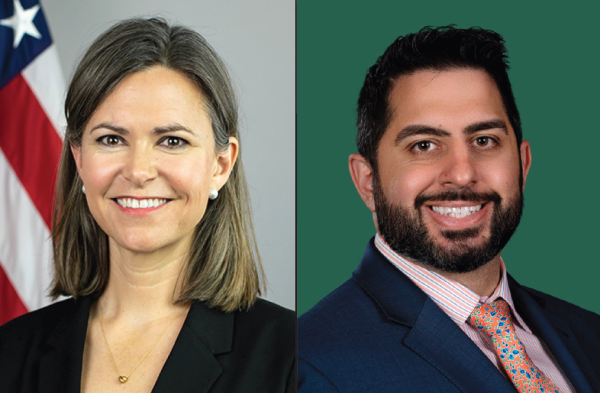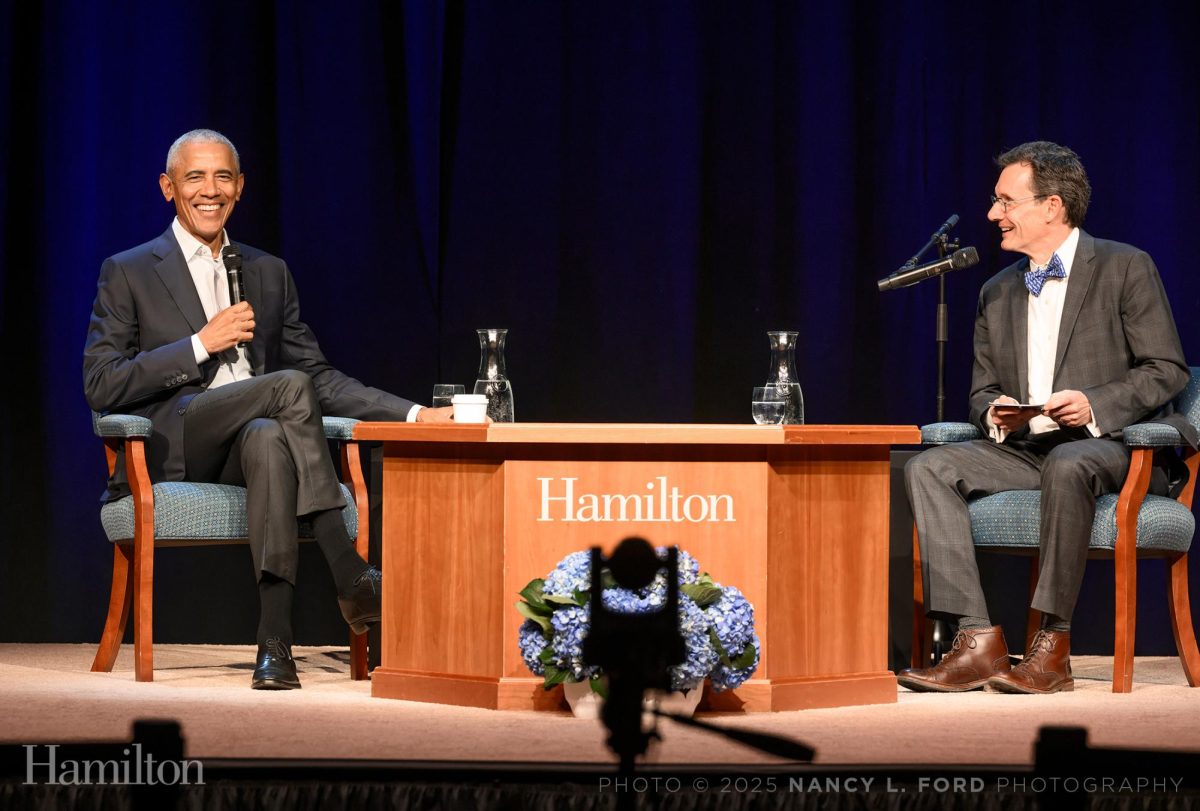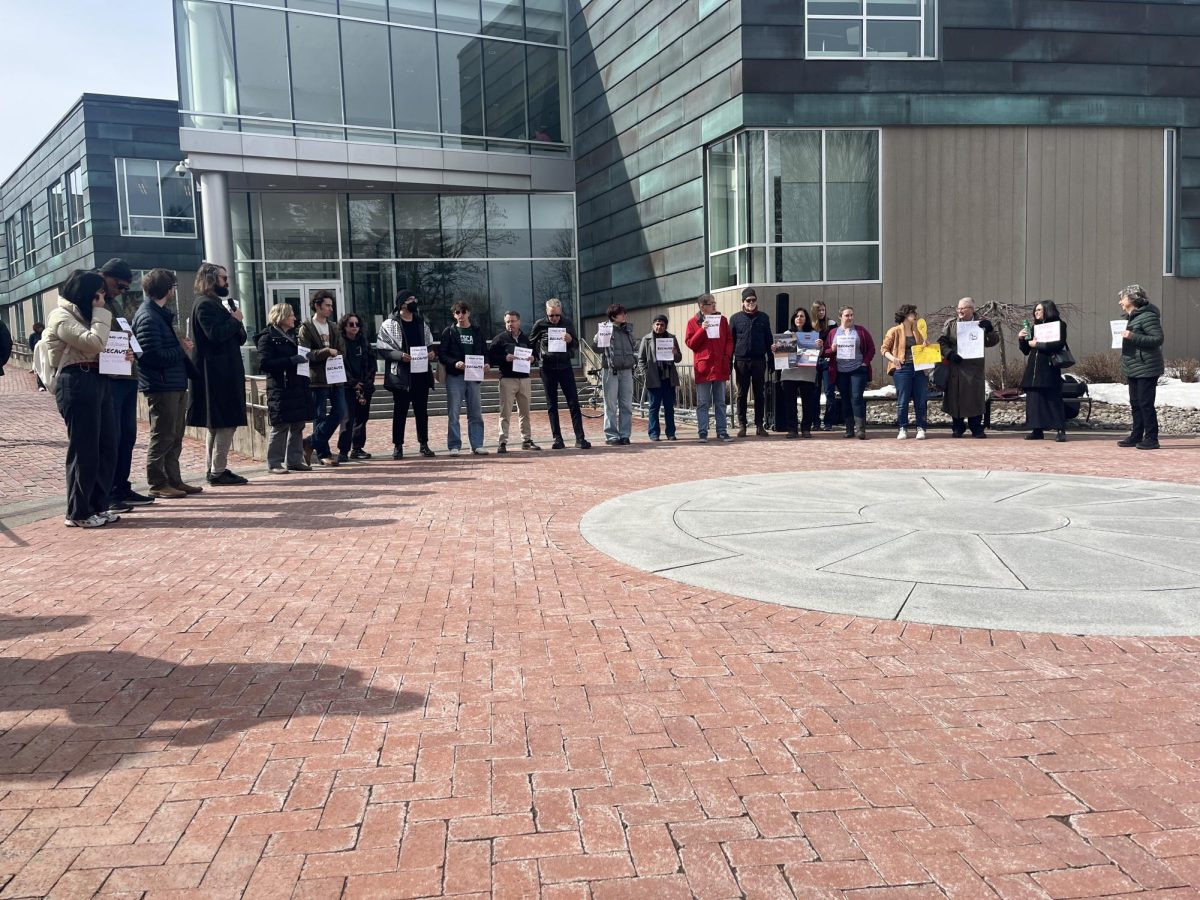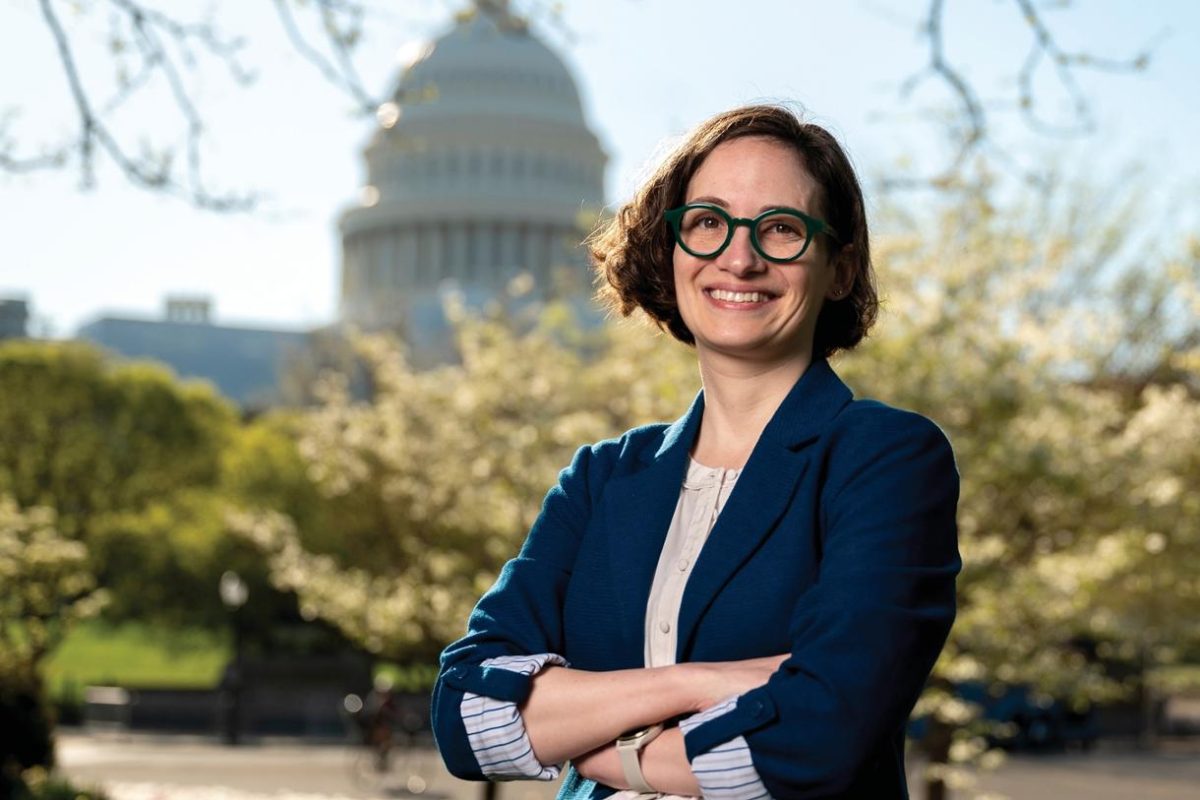
On Monday, Sept. 15, at 7:30 p.m., students, staff, faculty and community members poured into the Chapel to listen and question Emily Mendrala and Jon Baselice as they debated immigration policy in the U.S. This event was one of many coordinated by Common Ground and was moderated by Mimi Geerges, a guest host on C-Span Washington Journal. Topics discussed during the debate included how to update immigration policies, partisan divides in immigration enforcement, ICE’s increasing aggression in immigration enforcement and the deportation of student protesters.
Ty Seidule started the discussion with a speech about political violence, condemning the shooting of Melissa Horman and her husband, the arson attack on Josh Shapiro and the assassination of Charlie Kirk. He reaffirmed the ability of people to discuss politics across the political aisle, saying, “I want to treat people who disagree with me with honesty, dignity and respect, and I want to look for common ground where it exists and understand that common ground might not exist. And that’s okay too, and we will model that behavior tonight.”
Kicking off the debate, Geerges asked debaters to give historical context behind immigration policy in the U.S. Mendrala answered, “[Our immigration policy] has been stuck for decades, and so we’ve seen since the ’90s immigration policy being carried out largely by executive policy, by tinkering around the edges in a way that is incredibly vulnerable, flimsy. [Then] for one side to come in and wipe the ledger from what the previous person did, erect their own policy that is then susceptible to being wiped by their successor.”
Baselice provided his perspective, “I think we’re quibbling over rhetoric when we’re not really pointing at what. Why is it that our immigration laws are stuck in the past? Like, you look the last time the legal immigration system was reformed, [and] it was 1990. I’m not trying to age myself, but I was the ripe old age of six when that happened…This is designed pre-internet.”
As the conversation moved to the U.S-Mexico border under the Biden administration, Mendrala said, “During that administration, there were a couple of huge influxes, points in time when…there were so many people arriving at our border that our system could no longer keep up with the number of individuals coming…We had planned for that and anticipated policies around that. What we didn’t expect was several hundred individuals from Mauritania per day arriving at certain points during the Biden administration.”
When asked if President Biden could have closed the border like President Trump has, Mendrala responded, “So not everyone was paroled, and this is an incredibly complex issue, and I learned a lot during my four years in the Biden administration…Many countries around the world do not accept returns of their nationals, and so we had, at the time, no options to return individuals to those countries. They were placed into the United States to wait in the asylum backlog had a large number of individuals coming from Cuba, Haiti, Nicaragua and Venezuela and were able to work with Mexico to announce a program that, on the one hand, stood up a parole process for individuals to come in an orderly fashion, to receive a screening before they arrived in the United States, to be sponsored by individuals in the United States, oftentimes family members, and on the other hand, an enforcement mechanism to send individuals who did not avail themselves of that pathway…back to Mexico.”
Countering Mendrala’s point, Bascelice argued, “The key problem that you saw during the Biden term, particularly early on, is that once you had this influx of people coming early in 2020, the word was out. Overall, there are no negative consequences for showing up. The government’s been overwhelmed. There’s no desire to say, ‘Hey, we’re going to control the border, and you’re not allowed in.’”
The topic of enhanced vetting arose. Under the Trump administration, the vetting and customs process to get into the U.S has been made stricter than that of the Biden administration, including the consideration of online presence.
Mendrala said, “During the Biden administration, we came a long way on vetting…and never once did I see our vetting take into account loyalty pledges or infringing on freedom of speech in a way that didn’t also tick the national security and public safety boxes. And something that’s been really concerning to me is stories of effort, anecdotally, of individuals who have been denied entry or had their status revoked or visa revoked because they said something negative about the Trump administration. I think that’s a bridge too far.”
The floor shifted to Baselice, whose former boss, Marco Rubio, is currently acting as the United States Secretary of State. Baselice responded, “Look, I have my cause for concern with going down this path a little bit, but at the same time, we look at all the campus protests that happened recently and what some of these students are accused of doing and how they’ve treated their fellow classmates based upon their different religious beliefs or things like that. I had very little sympathy of those people so they get caught up in the system because they wanted to bully their fellow classmates in a way that I think [makes] you look at the national security or public safety boxes that you tick under the inadmissibility or mobility criteria.”
Mendrala replied, “I don’t see campus protests as a form of bullying…I think university should be a safe place for protest, for civic engagement, for students speaking their minds and engaging in activities that make their voices heard, be they American citizens of foreign students.”
Detention facilities, which have become increasingly crowded under the Trump administration, became the focus of discussion. Baselice said on the topic, “You had 300,000 people coming to the border in one month. You’re not covering that with 50,000 beds. You’re just not. So guess what? We have a lot more bed space, a lot more intensive space. There’s an awful lot of old military bases that have, you know, they just sit around and gather mothballs. That’s a place to put people.”
When asked about increasing deportations under the Trump administration, Mendrala said, “[Deportation quotas are] coming from enforcement operations against people that are residing in the United States. Sometimes they’ve been here for years, for decades. They have families, and it’s interior enforcement that’s done in an indiscriminate way…[Under the Biden administration] we’re not going to conduct enforcement operations at churches, at hospitals, at schools, at libraries, and [enforcement priorities and sensitive location policies] help dissipate the climate of fear that we’re seeing in today’s context, where interior enforcement has really ramped up.
Baselice responded, “There are individuals who may have lost status at some point, who have been in the country for decades. Those are individuals who should not be transported from their own town, wherever it may be, to an ICE detention facility in Louisiana. That I can agree with. However, if there’s no significant negative consequences for sub awful behavior, you get these problems where you have more and more people coming here illegally. We shouldn’t want that.”
With that, the discussion opened up to questions from the audience. One student asked how the federal government should handle sanctuary cities which refuse to cooperate with national immigration enforcement, a designation that has grown more common under the Trump administration.
Mendrala answered the question with, “What I think is concerning is when the federal government comes in and co-ops local law enforcement to use them for federal enforcement purposes, irrespective of the needs of the community. When they are co-opting local law enforcement for federal immigration purposes, they’re taking them away from the duties that they would otherwise be doing to serve their community, and I think that that’s an overreach.”
Baselice said, “At this point in time, a city wants to basically make a political statement saying, ‘we’re not going to cooperate with you.’ I think that’s just a step too far, and it’s a symptom that they’re just as big a part of the problem as anybody that they disagree with.”
Another student asked about criminal immigrants within the U.S, and whether the U.S is exposing its citizens to harm by having an open border policy.
While Bacelice responded by merely saying, “Preach brother,” Mendrala responded with, “I quibble with the notion of an open border policy. As I said, when individuals arrived at the southern border during the Biden administration, they were apprehended by CDP, taken to facilities, and processed there…When an individual is found to be either a national security concern or public safety risk, we have databases across the federal government that can alert our immigration systems.”
With questions answered, the speakers moved to their final words. Each of them gave a message to President Trump about the future of immigration policy in the U.S.
Mendrala said, “We need a system that meets American needs. We need a system that promotes order, but part of that system is bringing in newcomers to this country, immigrants, through lawful pathways that adhere to our values. And we don’t need a system that promotes fear…And most importantly, we need a system that is updated in statute, and so I would encourage him to be building connections and ties with Congress in a bipartisan fashion, to update our laws that are so severely outdated.”
Baselice said, “I would urge [President Trump] to do what we did tonight and get out, talk to people who don’t agree on this particular issue.”
Discussions about immigration with Common Ground will continue on Sept. 22. with Paul Hagstrom, Associate Chair and Leonard C. Ferguson Professor of Economics, will discuss and evaluate both sides of the debate while answering any lingering questions.





























